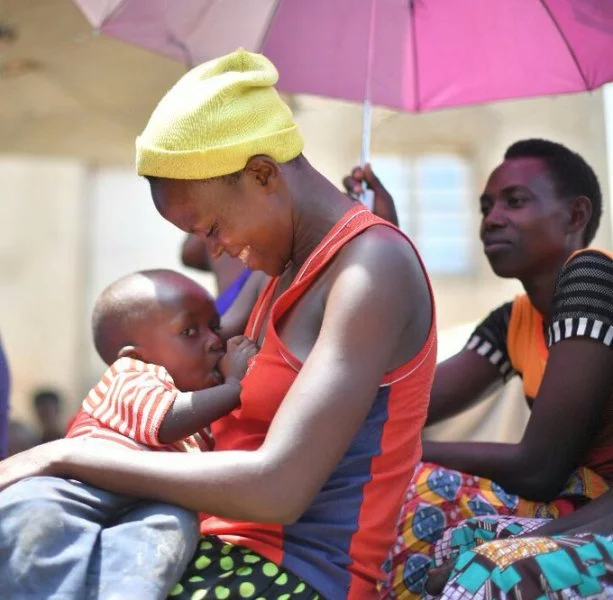Exclusive breastfeeding reduces infections and stunting among children

A happy mum breastfeeding her baby
Hinga Weze collaborated with the National Early Childhood Development Program (NECDP), other development partners and all districts to celebrate this years’ World Breastfeeding Week. The multiple events held August 1st to 7th were organized in different districts including 10 where Hinga Weze intervenes to fight against malnutrition and improve the nutritional status of women and children as one of its major objectives.
Organized under the theme: Support breastfeeding and complementary feeding practices for quality early childhood development, the event showcased the progress made by Hinga Weze in supporting 20,441 caregivers, mainly lactating and expectant mothers, to practice exclusive breastfeeding for the first six months and optimal complementary feeding for infants and young children. (Complementary feeding includes food groups consumed while continuing breastfeeding, meal frequency and consistency to meet the minimum acceptable diet).
The events also helped to increase child feeding awareness with a special focus on breastfeeding from o to 24 months, mobilize the community on the elimination of social norms that are a barrier to complementary feeding and initiate joint collaboration on prevention and reduction of malnutrition in Rwanda. Food groups which will be promoted to increase the dietary diversity for children and women include: i) Grains, roots and tubers; ii) Legumes and nuts; iii) Dairy products (milk, yogurt, cheese); iv) Flesh foods (meat, fish, poultry and liver/organ meats); v) Eggs; vi) Vitamin-A rich fruits and vegetables and vii) Other fruits and vegetables. They will also be sensitized on food expenditure to increase income to purchase nutritious foods they do not produce.
According to NECDP, Rwanda has made impressive results in improving exclusive breastfeeding from a child’s birth to 6 months. For instance, 99% of children are breastfed for at least some time, the median duration of breastfeeding is 28 months and almost 9 in 10 children under age 6 months are being exclusively breastfed. However, Rwanda still faces challenges regarding the continuity of breastfeeding from 6 months upwards and on-time introduction of appropriate complementary feeding. The celebrations helped to bridge existing gaps by presenting the benefits of breastfeeding in order to reduce common infections and stunting among children.
Working with NECDP, Hinga Weze promotes community awareness on good health and nutrition practices including practices in exclusive breastfeeding and complementary feeding for children.
Hinga Weze is a five-year USAID-funded project (2017-2022) that aims to sustainably increase smallholder farmers’ income, improve the nutritional status of women and children, and increase the resilience of Rwanda’s agricultural and food systems to a changing climate. By 2022, the project will have benefited over 700,000 smallholder farmers in ten target districts: Bugesera, Gatsibo, Kayonza, and Ngoma (Eastern Province); Karongi, Ngororero, Nyabihu, Nyamasheke, and Rutsiro (Western Province); and Nyamagabe (Southern Province) and across five value chains: high-iron beans, orange flesh sweet potato (OFSP), Irish potato, maize, and horticulture.

